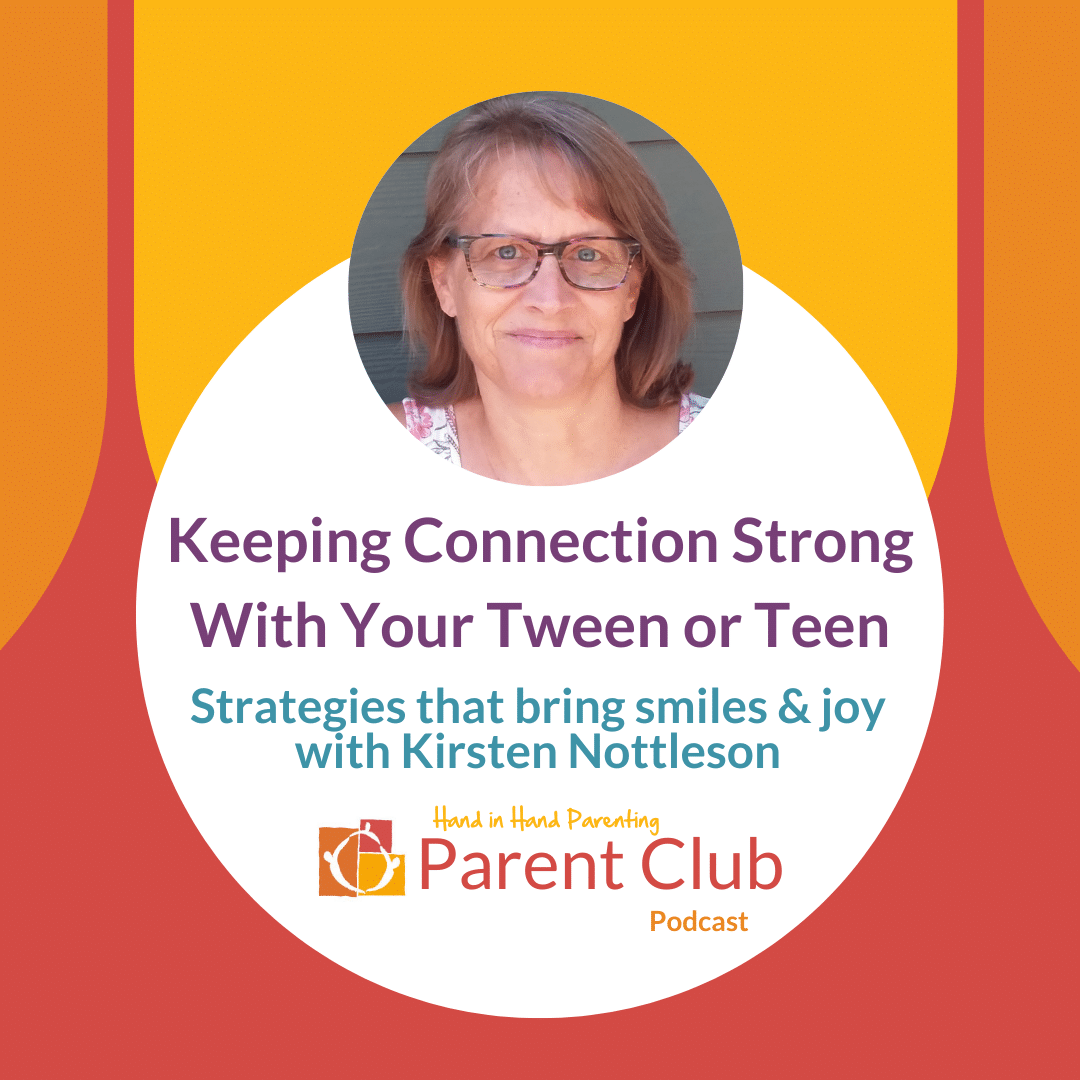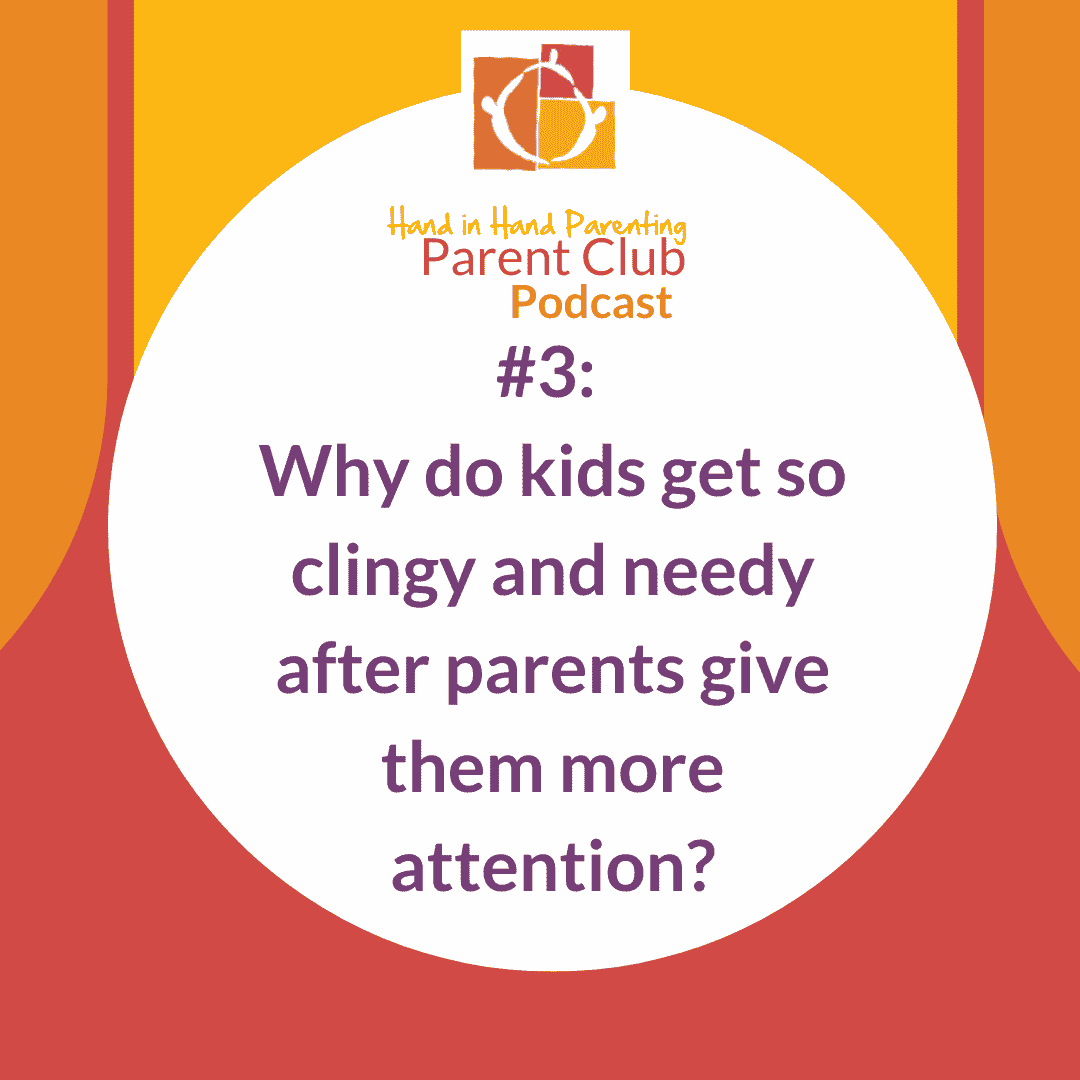Episode Transcript
Speaker 1 00:00:01 Welcome to the hand in hand parent club podcast. I'm Emily Murray, a hand in hand instructor and a mom of
Speaker 0 00:00:06 Two I'm Kathy Gordon, a single adoptive mom of a now young adult son, a hand in hand instructor. And we are both moderators of hand in hand's awesome membership program. The parent club,
Speaker 1 00:00:17 Every week, we'll be answering a parenting question. You'll hear about hand in hand. Parenting's powerful, respectful parenting tools. We'll share how they help you work with your child's feelings, especially when their behavior gets harder. Confusing.
Speaker 0 00:00:29 You can feel good about using these tools. They've brought warmth and connection to our own families and to many thousands of families around the world who are using the hand in hand approach.
Speaker 1 00:00:39 That's why hand in hand and the parent club exist. We're here to support you and your family. So you have more good, sweet, fun times together.
Speaker 0 00:00:49 Hey, their parents this week, we're asking the question, what do I do about the arguing whining and back talk?
Speaker 1 00:00:59 I, this is one of my <laugh>. This is a beloved topic for me, I think partly because this is one of the things that, that helped me find hand in hand. Um, I really struggled with what felt like defiance, uh, with what my older daughter, when she was younger. And it is just so hard to set a limit with, um, verbal off track behavior. But the key is that I, I needed to understand that it was off track behavior in order to work with it. So we see from a hand in hand perspective that verbal off track behavior and physical off track behavior, like aggression type things are really two sides of the same coin. These are both coming from the same place. So in the past several episodes, we've talked about looking underneath the behavior what's causing it. Where is it coming from? What's driving that behavior and really accepting that when they're off track, they, they truly can't think, and they can't process the words that are coming in during those really high, um, feelings, moments. Uh, what gets really tricky is as children get older, their verbal off track behavior gets more and more sophisticated. And it can actually sound like they're, they're having a negotiation or they're, they're, they're giving you logical points for, for why something should be happening or why it shouldn't be, um, like
Speaker 0 00:02:44 The little lawyer they become, right? Little lawyers <laugh>
Speaker 1 00:02:49 And it's exhausting as a parent,
Speaker 0 00:02:52 Or just why asking? Why, why, why
Speaker 1 00:02:58 Or that like, just, um, picking apart our reason for setting a limit to the point where we can question ourselves, like, why am I, no, I do need to set this limit so we can get really confused. The more sophisticated their off track behavior gets. Um, so if, if you've tried reasoning and you've tried logic or you've met the need once, um, and it continues, or it has kind of a, a heated, um, feeling to it, that's a signal to you as the parent that, oh, I think we're getting out of thinking brain space here. I think there's more to this conversation. I say lightly <laugh>, um, than, uh, than actually trying to find a solution. This is, this is coming from feelings. This is coming from fear, tension, overload, upset. Um, I remember a switch for my older daughter. I think it was, you know, as she was getting up toward middle school age, uh, where, um, I had to re I had to really be aware of that difference of, oh, she's not trying to engage me in a conversation.
Speaker 1 00:04:12 She's trying to offload her day or offload her current tensions. Um, and it's just coming out in words instead of how it used to be, which was, you know, she'd have a tantrum or she'd throw something or, um, she'd, you know, fall on the floor and kick when she was a year and a half or two years old. So verbal off track behavior, verbal, um, aggression. If you wanna think about it this way is just another kind of off track behavior. And we can't just say, stop talking to me that way. <laugh> that, that just doesn't, it's not effective. It doesn't work. It doesn't help. It's not useful. Um, in the same way that we can interrupt a child, who's throwing something. And we can say, ah, I can't let you throw that. Um, or like, no second cookie. No, no second cookie. Yeah. It's, it's easier when it it's a physical limit at times.
Speaker 1 00:05:07 At least it felt that way to me. So there are a couple of ways you can work with this kind of verbal aggression, um, instead of those straight limits. And we haven't talked about this yet in the podcast. Um, but we will so keep tuning in, in a few more episodes, we'll get to play listening, which is another parent, a hand in hand parenting tool, but a playful light response to their verbal off track behavior is such a magical way to give them an out. So when they're in that cranky prickly place, they don't want to be there either. It's not fun for them, and it's not fun for us, but we can help them out of that by giving them this. Um, it's, it's like throwing them one of those, you know, lifeguard rings, uh, and they can move back to their thinking brain or move back to some laughter that actually is productive in helping them feel a little more relaxed. So, um, and
Speaker 0 00:06:07 That's actually helped me, um, with, with, uh, uh, knowing that they can't think is when I think, oh, they don't wanna be like this they're whining, they're prickly. And I say to myself, they're, they're really having a hard time. They don't wanna be like this. And that helps me know, oh, they can't think this is not like a reasonable discussion. They really can't think
Speaker 1 00:06:32 Yeah. That switching that, um, frame that lens to, to view the situation helped me so much. I, so I, I struggled a bit with play listening when I first started as an instructor, but really play listening is such a great response. Just a light, you know, a, a playful mock threat of, oh, if you don't, if you don't come outta there right now, I'm gonna eat my elbow. And the key with this is you actually will playfully try to do it, cuz they're gonna say, all right, then do it. And then you'll just be like, oh, I can't reach, I can't reach, um, a famous one that my daughter loved for a long time was, you know, she had a prickly morning and didn't wanna get out of bed. I jump in the bed with her and say, oh, let's hide. I don't wanna get outta bed either. Um, I would sometimes be a playful bumbling servant if, if, um, my kids are in that like nothing's right. Nothing you do is right. I, I, I use a silly voice and I, I switch into a different role. Um, so just look for ways that you might be able to use laughter to help them out of that prickly spot when they get stuck in that verbal aggression
Speaker 0 00:07:47 And you actually still are setting a limit. It doesn't seem like it, it might seem like, well, if they're, if they're whining, if they're giving me back talk, why am I being playful? Why am I being light? Why am I, you know, um, responding with like, oh, if you don't, if you don't change that tone of voice, you're getting a thousand kisses. I gotta, I'm gonna find all those prickly bugs and pull 'em outta your ears, you know, but it actually is a way of limiting what they're saying. Um, but, and by like reaching underneath that prickliness in order to help release the tension. So it is still bringing a limit, even though it seems like you're kind of leaning into what their, uh, you know, their prickliness and, and you are, you're, you're connecting with this. Like, it's almost like I can't let you do that and I'm gonna show you, I can't let you do that in a really affectionate way.
Speaker 1 00:08:52 Yeah. It's, it's a way to show them. We still see their good that they are good under all that. Prickliness we see their goodness and we help it come back out.
Speaker 0 00:09:01 Yep. Yep. And there, but the, it is, um, Emily, you know, you've, you've mentioned sometimes that you've gotten silly or playful with this, with when your daughter's been prickly and she's not responded. She hasn't, it hasn't helped lift the tension. In fact, it kind of escalates the tension. So what have you, what have you done then?
Speaker 1 00:09:24 Yeah, I, I think in those moments, um, my invitation for humor feels like I'm belittling or demeaning, the seriousness of what she's feeling. And she lets me know <laugh> in, in either behavior or words. Um, and I just apologize and, and switch gears into, stay listening more traditional, stay listening kinds of things, a simple I'm so sorry. That was, I was being silly. That was not what you needed. Um, tell me more, tell me what's really going on and that invitation and acknowledgement that I was wrong. I missed the cue. I respect her and her feelings. Um, that, that little bit of safety building often helps the feelings pour out.
Speaker 0 00:10:07 Yep. Yeah. That, that, you know, um, uh, again, it still is bringing a limit on that off track, but it's bringing in, in a way of like, you know, I'm just gonna be here and I'm just gonna listen and I'm gonna see the tension that's underneath there. And that brings us to, um, another way to handle this, the arguing, the whining, the back talk as Emily started out, uh, talking about everything we've been saying the last few weeks has been about what's underneath this behavior. And so something that you might experiment with is, um, instead of, you know, getting triggered and, and getting like it starting to butt heads, you might experiment with actually meeting the need, um, that this is a cry for connection and you might, um, what we call, fill the need. And that might be like, um, something like, uh, Emily mentioned where you, um, offer, uh, to do something for them.
Speaker 0 00:11:19 Um, you wrap them up in your arms and swaddle them. Like you're, they're, you're there your sweet baby. And you start talking about what it was like when they were first born and they're cute nose. And, and when they, you first saw their cute nose and how you love that nose. And so it's a, you know, or you might, um, uh, uh, you know, choose to do something like, um, dress them or even, um, uh, feed them or, you know, and, and this might seem counterintuitive because it's off track behavior, it's behavior we don't want, and aren't, I like rewarding it, but again, we're reaching underneath that behavior and we're not talking about being permissive, not at all. You know, if they're whining about wanting another cookie or if it's your, you know, adolescent who's whining about more screen time or, you know, there's, or, um, there's something that they're wanting you to do or, or give them, or, you know, they're wanting to go over to their friend's house and you're really setting a limit on that.
Speaker 0 00:12:29 So you're not giving in, you're not appeasing them, but you are overfilling their need for connection. You're like grounding them by just, um, uh, babying them for a, a short period of time. Very specific. It's a very specific choice, a very specific strategy that you're doing. And you're still saying, no, sweetie, we're not going to the park or no, we're not staying longer or no, no more TV. You're still holding that limit, but you are reaching underneath their snarkyness to, um, to, to connect with their goodness and to connect with that naturally good part of them, you know, one, um, great example that, uh, an instructor wrote about was, um, uh, her daughter was, uh, you know, just every, any time she would, um, bump into something or, um, you know, anytime she would, um, accidentally, uh, hurt herself, it was a huge to do, you know, and, um, it, it was everyone else's fault.
Speaker 0 00:13:43 You know, why did you push me? Which of course no one had, or, you know, or you made me fall down or, you know, like if she was a lot of blaming and the mom was a little confused as to like, oh, how to, you know, how to, um, what was really going on underneath this? And so she decided to, to meet the need to overfill the need. And when there was a huge upset, you know, when her daughter got hugely upset over just a tiny little bump, um, you know, the mom would like cool and ah, and kiss it and make it better and really join her daughter in her upset, not in a panicked way, but in a, a, a comforting way of you might call it, babying her, but it only took a few times of that before, whatever that tension was, that little chunk of fear that was causing the huge reaction to just a tiny bump. It only took a few times of over meeting that need overfilling that need before, like that behavior just disappeared. So, you know,
Speaker 1 00:14:53 I think it's, um, the, the two threads that are similar between that story and the story that I told are we're taking the feelings seriously, even though the way the feelings are being expressed to our logical rational brain seems small or wrong or insignificant or
Speaker 0 00:15:11 Annoying.
Speaker 1 00:15:12 Yeah. Or annoying, very
Speaker 0 00:15:13 Annoying
Speaker 1 00:15:14 <laugh>. But the Fe we take the feelings underneath those expressions of the feelings really seriously and respectfully.
Speaker 0 00:15:21 Yeah. And when we, uh, address the feelings, when we connect with the feelings, that's when we, you, you see a shift in the behavior and you get your generous cooperative thinking child back when you're reaching underneath the behavior for the feelings.
Speaker 1 00:15:43 So our one small thing for you this week is, um, to not take the bait, look for opportunities where you're noticing an off track behavior, and maybe it's prickly, and maybe it's kind of aggressively coming at you, but instead of meeting it in, in that plane, you're gonna go deeper. Um, so when you don't take the bait and when you see it for what it is, which is just an expression of feelings, oftentimes we have a little bit more access to our creative thinking about how to meet that with connection and how to figure out what's actually driving that behavior. So don't take the bait this week, see what happens.
Speaker 0 00:16:22 Yep. And, uh, next, next time, we're gonna give you some more specific ideas on what, how you can kind of, uh, program your thinking so that you won't, that won't be your instinct to take the bait. We're gonna, um, give you some more ideas around that.
Speaker 1 00:16:39 Thank you so much for tuning into the hand in hand parent club podcast, please liken subscribe to hear more and to connect with us between these episodes. Come on over to hand in hand parenting.org to join the parent club where you can get coaching classes and live support.
Speaker 0 00:16:52 Come join our vibrant community of parents in the parent club who are committed to getting the support. They need to be the parents they wanna become. We'd be honored to support you too. This podcast and the parent club are part of hand in hand parenting, a nonprofit organization that supports parents all over the world. We are here for you when parenting gets hard.


